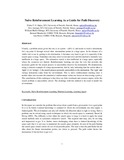| dc.description.abstract | Usually, a problem arises given that one is at a point – call it A, and needs to reach a destination,
let’s say point G through several other intermediate points in a large space. In the absence of a
viable tool to use in getting to the destination, it becomes very hard to get to it especially if the
search space is large. Sometimes one may resort to trial and error and this method is normally very
inefficient in a large space. The exhaustive search is also inefficient in a large space, especially
where the resources are limited. Reinforcement learning can play the role that provides the
necessary guide for the search process to successfully discover the destination. We demonstrate,
using a concrete example of a map representation, that by only indicating that the action taken is
'right' (1) or 'wrong'(-1) the search process proceeds successfully to the destination. The 'right' and
'wrong' indications come from the environment. This is naïve reinforcement learning since it
neither takes into account the cumulative reinforcement values nor insists on discovering a policy.
The contribution of this technique is that there are little overheads and resource inputs, while the
search problem is successfully solved. The challenge with this method is the need to model the
environment. | en |

